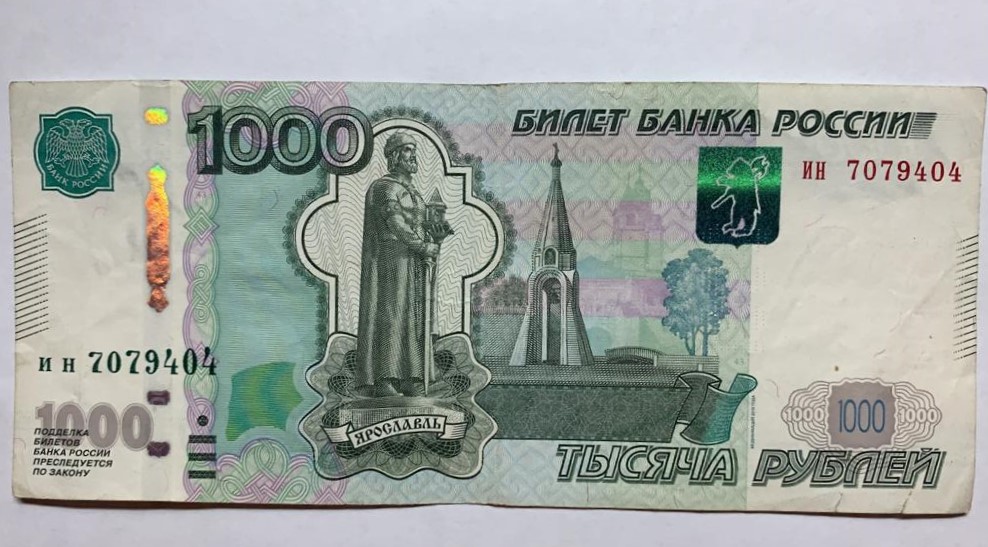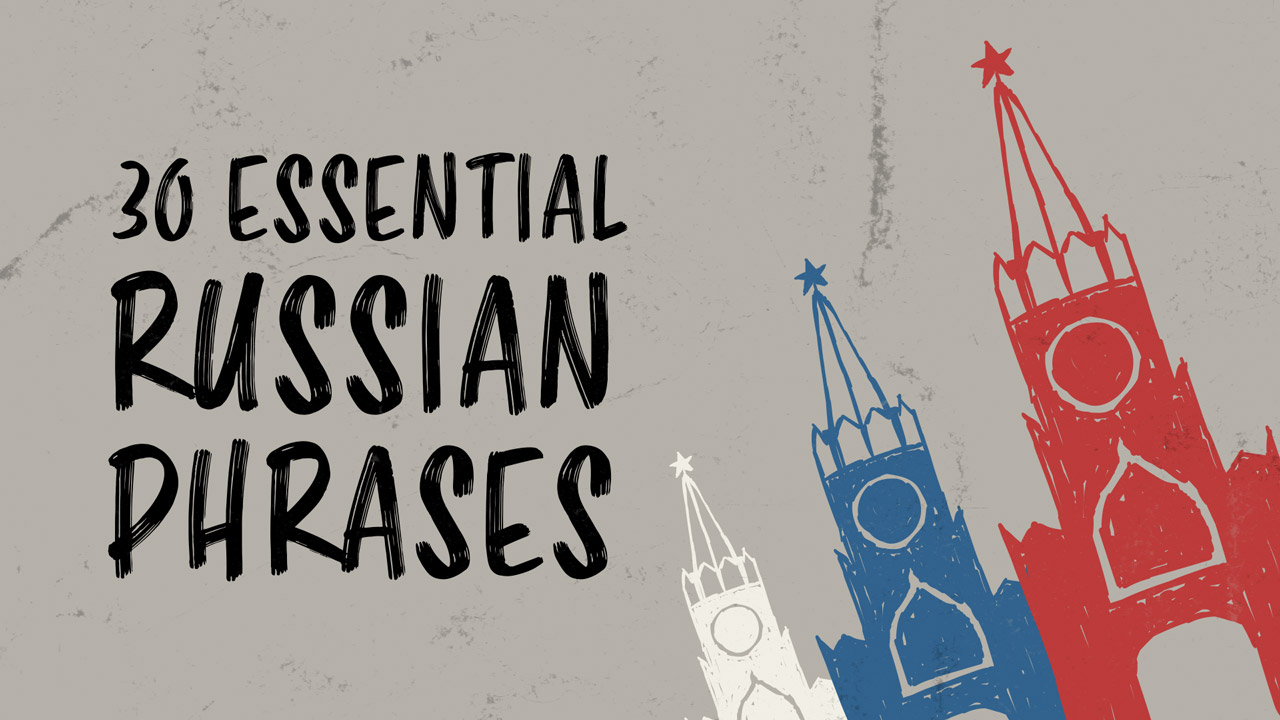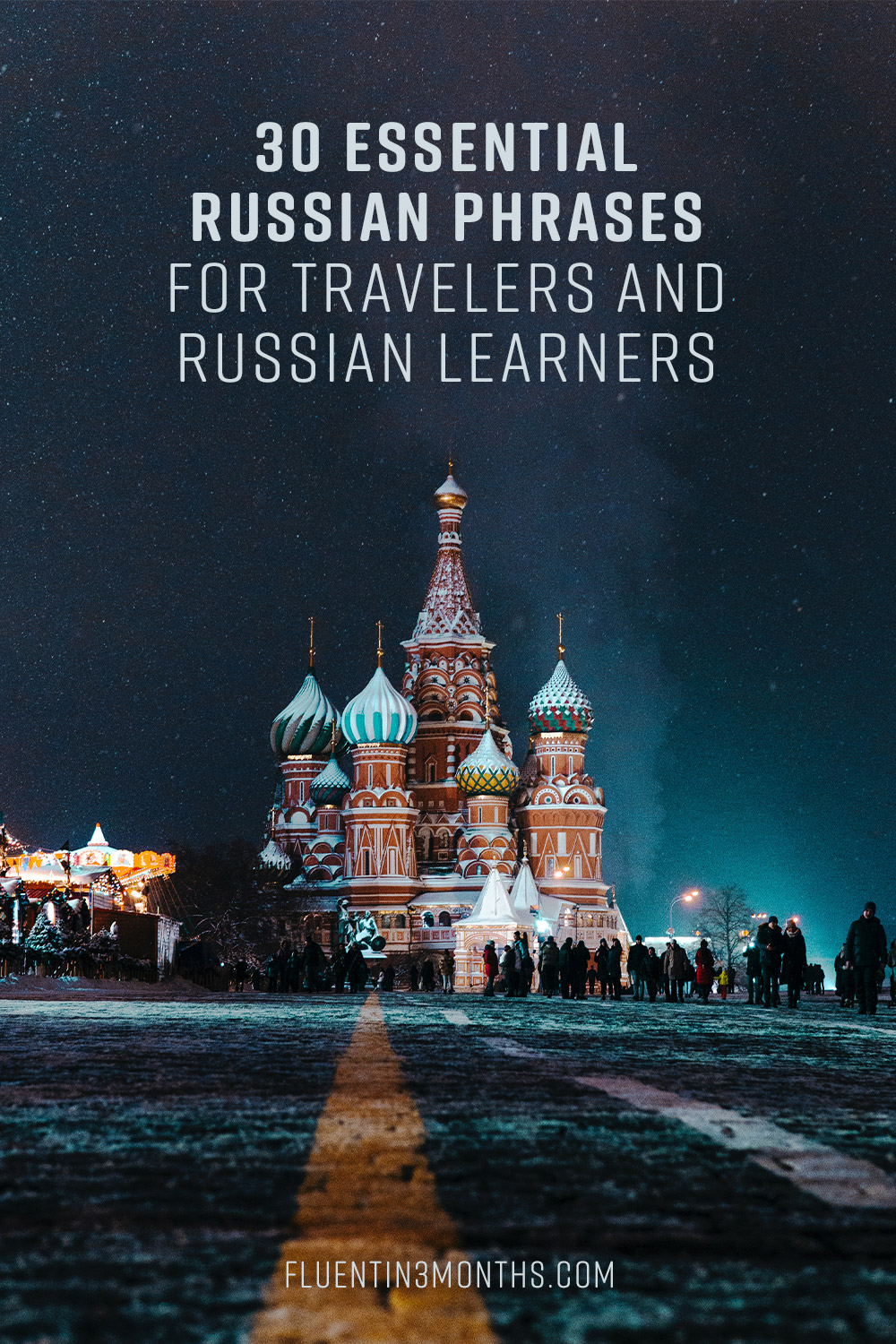30 Essential Russian Phrases for Travelers and Russian Learners
I want to share the most important Russian phrases for you to learn.
For beginner Russian learners, you’ll find this whole article helpful, so you’ll want to take note of all the Russian phrases I share below. With that on mind, I’ve written the first part of this article just for you, covering some essential greetings, introductions and survival phrases to help you make progress at the start of your linguistic path.
For those a little further along on their Russian learning journey, head to the second part of this article for 10 essential conversational Russian phrases for improved communication. If you’re already a bit of an advanced Russian master, we haven’t forgotten about you – check the final part of this article for 10 very useful informal words and expressions. Choose your level and let’s go!
Table of contents
- Part 1: Essential Russian Phrases for Beginners Starting Out, with Numerous Examples and Usage Tips:
- Introductions in Russian
- 1. Как жизнь? (Kak zhizn’?) – ‘How’s life?’ in Russian
- 2. Что нового? (Shto novovo?) – ‘What’s new?’ in Russian
- 3. Сколько лет, сколько зим! (Skol’ko let, skol’ko zim!) – ‘Long time no see’ in Russian
- 4. Здорово (Zdorovo) – ‘Hey’ in Russian
- 5. Чем занимаешься? (Chem zanimaeshsya?) (informal)/Чем занимаетесь? (Chem zanimaetes?) (formal) – ‘What have you been up to?’ in Russian
- 5 Useful Russian Phrases in a Shop or Cafe
- 1. Дайте счет пожалуйста? (Dayte shot pozhaluista?) – ‘Could I have the bill, please?’
- 2. Можно мне… (Mozhno mne…) – ‘May I have…’
- 3. Это ваш (кофе/стол/друг?) (Eto vash kofe/stol/drug)? – ‘Is this your coffee/table/friend?’
- 4. Не за что! (Ne za shto!) – ‘You’re welcome!’
- 5. Сколько стоит? (Skol’ko stoit?) – ‘How much is it?’
- Part 2: Useful Russian Phrases for Beginner and Intermediate Learners Looking to Broaden Their Speaking Skills
- 10 Useful Conversation Starters, Fillers and Ways to Express Yourself to Keep Conversation Going
- 1. Как вам/как тебе… (Моцарт)? (Kak vam/kak tebe [Motsart]?) – ‘What do you think about (Mozart)?’
- 2. Как насчёт…? (Kak naschyot…?) – ‘How about…?”
- 3. Ты должен(а)… (Ty dolzhen/ty dolzhna…)/ Вы должны… (Vy dolzhny…) – ‘You should…’
- 4. Я тебе/вам советую… (Ya tebe/vam sovetuyu) – ‘I recommend that you…’
- 5. По моему мнению (po-moemu mneniyu) – ‘In my opinion’
- 6. По моему опыту (po moemu opytu) – ‘In my experience’
- 7. Давай (davay) – ‘Let’s go’
- 8. Расскажи подробнее (Rasskazhi podrobnee) – ‘Tell me more’
- 9. Насколько мне известно (Naskol’ko mne izvestno) – ‘As far as I know’
- 10. С моей точки зрения (S moey tochki zreniya) – ‘From my point of view’
- Part 3: Informal Russian Phrases for Beginner, Intermediate and Advanced Learners
- 10 Common Informal Words and Phrases with Examples and Usage Tips
- 1. Ничего себе! (Nichevo syebye) – ‘You don’t say!’
- 2. Офигеть! (Ofiget’!) – ‘No way!’
- 3. Да ладно (Da ladno)/Да ладно тебе (Da ladno tebe) – ‘Don’t worry, yeah right’
- 4. Не парься (Ne par’sya) – ‘Don’t worry’
- 5. Бабки (Babki) – ‘Money’
- 6. Хавать (Khavat’) – ‘To eat’
- 7. Ерунда (Erunda) – ‘rubbish, nonsense’
- 8. Свалить (Svalit’) – ‘To leave’
- 9. Штука (Shtuka) – ‘a thing’
- 10. Бесить (Besit’) – ‘to annoy’
- Russian Phrases – Summing Up
Part 1: Essential Russian Phrases for Beginners Starting Out, with Numerous Examples and Usage Tips:
Introductions in Russian
When you’re learning a new language and are beginning to find your feet, the hardest part when interacting with others can sometimes be initiating conversation. Here are 5 surefire introductions to break the ice:
1. Как жизнь? (Kak zhizn’?) – ‘How’s life?’ in Russian
Quite literally ‘how’s life’, this is a great phrase to find out how your interlocutor is doing. Short replies you can expect to this question include: нормально (normal’no, ‘okay’), хорошо (khorosho, ‘good’) and плохо (plokho, ‘bad’).
2. Что нового? (Shto novovo?) – ‘What’s new?’ in Russian
This means ‘what’s new’ and is sure to get your conversation partner talking. Unless they reply with ‘ничего’(nichevo) ‘nothing’, but at least you asked!
3. Сколько лет, сколько зим! (Skol’ko let, skol’ko zim!) – ‘Long time no see’ in Russian
This phrase is for greeting someone you haven’t seen for a while, meaning ‘how many summers, how many winters have passed’!
4. Здорово (Zdorovo) – ‘Hey’ in Russian
Let’s face it, it can be tough repeating the same greetings of привет (privet) for informal situations and ‘здраствуйте’ (zdrastvuite) for more formal ones. So here’s another alternative, Здорово (zdorovo), close to ‘hey’ in English. Remember to keep the stress on the second ‘o’ for correct pronunciation to avoid similarity with the word for ‘great’.
5. Чем занимаешься? (Chem zanimaeshsya?) (informal)/Чем занимаетесь? (Chem zanimaetes?) (formal) – ‘What have you been up to?’ in Russian
Literally ‘what takes up your time’, this can be interpreted as what a person does as a profession or what they do in their free time, so is a universal elixir for conversation.
Those five phrases should serve you well, but if you’re looking for even more introductions at a beginner level, 15 Ways to Say Hello in Russian is an excellent place to start.
5 Useful Russian Phrases in a Shop or Cafe
Nobody wants to be tongue-tied at the cafe table, so kiss cafe-related anxieties goodbye with these instantly usable phrases.
1. Дайте счет пожалуйста? (Dayte shot pozhaluista?) – ‘Could I have the bill, please?’
2. Можно мне… (Mozhno mne…) – ‘May I have…’
Need a pen? Можно мне ручку? (Mozhno mne ruchku?) Can I take a look? Можно мне посмотреть? (Mozhno mne posmotret’?) You could even combine this with our previous phrase to give Можно мне счет пожалуйста (Mozhno mne shot pozhaluista) – now you’ve got two ways to ask for the bill!
3. Это ваш (кофе/стол/друг?) (Eto vash kofe/stol/drug)? – ‘Is this your coffee/table/friend?’
Let’s face it, cafes and restaurants are ripe territory for seating mishaps and lost property, so this phrase will serve you well.

4. Не за что! (Ne za shto!) – ‘You’re welcome!’
This is a nice alternative to пожалуйста, and it’s easier to spell as well.
5. Сколько стоит? (Skol’ko stoit?) – ‘How much is it?’
As in ‘сколько стоит торт?’ (Skol’ko stoit tort?, ‘how much does this cake cost?’).
Part 2: Useful Russian Phrases for Beginner and Intermediate Learners Looking to Broaden Their Speaking Skills
10 Useful Conversation Starters, Fillers and Ways to Express Yourself to Keep Conversation Going
When your Russian level begins to break into intermediate territory, you may well find that your listening is developing well but speaking remains a roadblock, especially with all of those troublesome case endings to think about! Here are 10 useful phrases you can use in almost any conversation to add to your speaking arsenal and help you to wave goodbye to those awkward silences.
1. Как вам/как тебе… (Моцарт)? (Kak vam/kak tebe [Motsart]?) – ‘What do you think about (Mozart)?’
2. Как насчёт…? (Kak naschyot…?) – ‘How about…?”
This is the ultimate phrase for suggestions, as in Как насчёт завтра? (kak naschyot zavtra, ‘how about tomorrow’) when making arrangements.
3. Ты должен(а)… (Ty dolzhen/ty dolzhna…)/ Вы должны… (Vy dolzhny…) – ‘You should…’
Always a useful way to use to give advice, as in ‘ты должнен спать больше’ (ty dolzhen spat’ bol’she, ‘you should sleep more’). This construction can also be used in the past – ты должен был уйти (ty dolzhen byl uiti), meaning ‘you should have left’.
4. Я тебе/вам советую… (Ya tebe/vam sovetuyu) – ‘I recommend that you…’
Another great phrase for advice, as in я тебе советую слетать в этот город (ya tebe sovetuyu sletat’ v etot gorod, ‘I recommend that you fly to this city’).
5. По моему мнению (po-moemu mneniyu) – ‘In my opinion’
To give your opinion, you can use: по моему мнению (po-moemu mneniyu) which just means ‘in my opinion’.
6. По моему опыту (po moemu opytu) – ‘In my experience’
You can also try по моему опыту (po moemu opytu, ‘in my experience’) and по-моему пониманию (po moemu ponimaniyu, ‘in my understanding’).
7. Давай (davay) – ‘Let’s go’
This is possibly the gold standard of versatile Russian phrases. This is one you’ll get to use all the time. It can mean ‘goodbye’, ‘go on’ (when cheering on your favourite football team) or even ‘let’s go’/let’s do it’. Давай встретимся завтра в 1400? – Давай. (Davai vstretimsya zavtra v 1400? – Davai., ‘Shall we meet tomorrow at 1400? Let’s do it.’).
8. Расскажи подробнее (Rasskazhi podrobnee) – ‘Tell me more’
Quite simply, this means ‘tell me more’. Avoid awkward silences in a conversations from here on out, even with those who are economical with words!
9. Насколько мне известно (Naskol’ko mne izvestno) – ‘As far as I know’
As in, насколько мне известно, она там тоже работала (naskol’ko mne izvestno, ona tam tozhe rabotala, ‘as far as I know, she worked there, too’).
10. С моей точки зрения (S moey tochki zreniya) – ‘From my point of view’
Посмотрите на это с моей точки зрения (posmitrite na eto s moey tochki zreniya, ‘take a look at this from my point of view’).
Part 3: Informal Russian Phrases for Beginner, Intermediate and Advanced Learners
For the advanced learner, informal expressions often remain as an elusive final frontier, with resources hard to come by. To help out, here are 10 informal phrases to aid you in your language learning journey.
10 Common Informal Words and Phrases with Examples and Usage Tips
1. Ничего себе! (Nichevo syebye) – ‘You don’t say!’
This is an extremely versatile way to express surprise. Ты купил новую тачку? Ничего себе! (ty kupil novuyu tachku? Nichevo syebye!) You bought a new car? Awesome! Ну ничего себе какой тяжёлый день! (Nu nichevo sebe kakoy tyazholy den’!) Wow, what a rough day!
2. Офигеть! (Ofiget’!) – ‘No way!’
Офигеть! (Ofiget’!) is a general way to show that you’re surprised, with a meaning close to ‘no way!’ in English. Or it’s used to state annoyance with another person – они офигели (oni ofigeli, ‘they’re taking the mickey’).
3. Да ладно (Da ladno)/Да ладно тебе (Da ladno tebe) – ‘Don’t worry, yeah right’
This phrase usually means ‘don’t worry’, as in ‘экзамен сдашь, да ладно’(ekzamen sdash, da ladno, ‘you’ll pass the exam, don’t worry about it’). But it can sometimes also mean ‘yeah right’ as in: Ты знаешь Илона Маска? Да ладно тебе!’ (Ty znaesh Ilona Muska? Da ladno tebe, You know Elon Musk? Yeah, right!’).
4. Не парься (Ne par’sya) – ‘Don’t worry’
Все будет хорошо, не парься (Vsyo budet khorosho, ne par’sya, ‘Everything will be fine, don’t worry!’). A great phrase for calming those around you when things get a bit stressful.
5. Бабки (Babki) – ‘Money’
Money is one of those areas in a language that always attracts a few common slang terms. And the one you are most likely to hear is ‘бабки’ (babki) simply meaning ‘dosh’. Another one that might come in use is косарь (kosar’), a thousand-rouble note.

6. Хавать (Khavat’) – ‘To eat’
This is an informal alternative to есть (yest’, ‘to eat’). Я пошел хавать (Ya poshyol khavat’) – ‘I’m off to munch on something’. You might also come across ‘хавчик’ as a less formal alternative to ‘food’.
7. Ерунда (Erunda) – ‘rubbish, nonsense’
A general term for ‘nonsense’ or ‘rubbish’. Oн в такую ерунду никогда не верил (On v takuyu erundu nikogda ne veril, ‘He didn’t believe in that kind of rubbish’).
8. Свалить (Svalit’) – ‘To leave’
This is a handy, informal form of ‘to leave’.For example, короче, я сваливаю (koroche, ya svalivayu, ‘right, I’m off’), or свалю отсюда (svalyu otsyuda, ‘I’m out of here’).
9. Штука (Shtuka) – ‘a thing’
This means ‘a thing’ as in чертовски интересная штука – любовь (chertovskiy interesnaya shtuka – lyubov’, ‘love is a damn interesting thing’). It’s also really useful when you don’t know the word for something.
10. Бесить (Besit’) – ‘to annoy’
Feeling irritated and need to express it? Бесить (besit’) is just the verb for you, as in меня бесят грамматические ошибки (menya besyat grammaticheskie oshibki, ‘grammatical errors really irritate me’).
Russian Phrases – Summing Up
Hopefully these Russian phrases will help you improve your level of Russian communication and impress your conversation partners. So enjoy putting them into practice! But don’t stop there for today, another excellent place to continue on is 47 Russian Lessons for Learners on a Budget.




Social